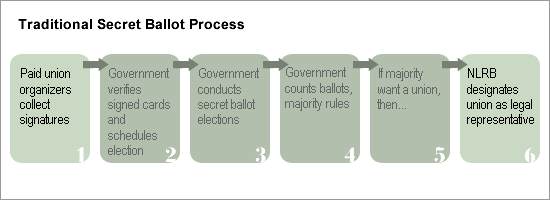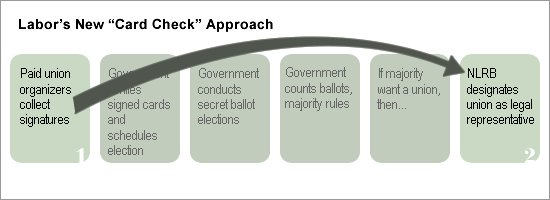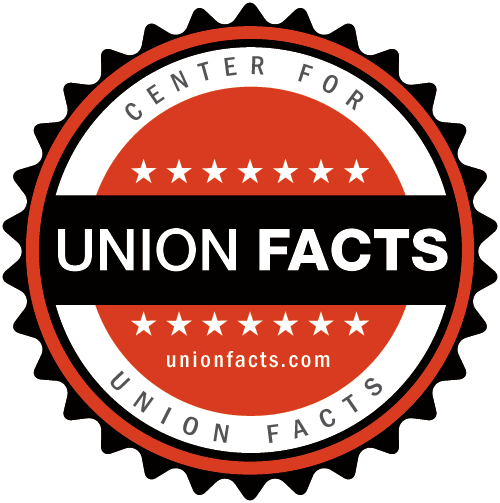Undemocratic Leaders
Facing declining membership, union officials have turned to the highly questionable practice of organizing new members through a process called “card check.”
With a card check, paid union organizers pressure workers to sign cards indicating that they support the union. The card is effectively a binding contract that, among other things, will require employee to pay union dues in order to keep their jobs. Some union organizers employ tactics including deception, coercion, and harassing visits to workers’ homes in order to get them to sign a card.
Current law dictates that an employer can either choose to recognize a union based on the card check or call for a secret ballot election to make certain that the employees’ true feelings are recognized. Recent data from the National Labor Relations Board indicates that in 2009, 38 percent of all union organizing efforts were conducted through a card check.
Why would a business deny its employees the opportunity to conduct an anonymous, government-supervised vote? In those relatively rare instances in which an employer has agreed to card check, the employer itself has often been under union pressure—which includes threats of a negative public relations campaign intended to injure a company’s reputation until the company capitulates.


Understanding Card Check
Legal recognition of a union has traditionally been achieved through secret ballot elections, in which each worker decides whether or not to support a union in the privacy of the voting booth — just like a person votes for the President or a Senator. But unions frequently lose secret ballot elections. So they often bring intense pressure on companies to agree to a “card check” system instead of a secret election.
[more…]
Between 1935 and 1947, the National Labor Relations Act allowed for secret ballot elections or “other suitable methods” to determine union recognition. Union spokespersons often note this fact, but stop here. They fail to acknowledge that in representation cases handled by the NLRB, only an estimated 20 percent were through the card check method.
[more…]
Facts about Card Check
Union officials rely on statistics generated by friendly and well-funded researchers, often at academic institutions, to claim that there is widespread oppression of workers’ rights.
[more…]
The only hard analysis of National Labor Relations Board data found that only 2 percent of elections involve employees being wrongfully terminated.
[more…]
The Problem of Card Check
Card Check Intimidation, Coercion, and Confusion
A secret ballot prevents most ills, since no one knows how an employee will vote or voted, irrespective of signing a card. Conversely, a serious flaw in the public card check process is that it is inherently rife with the potential for intimidation by union officials.
[more…]
Everyone (Including Union Leaders) Prefers Real Elections
The public, the courts, leading editorial pages, and politicians all prefer secret ballot elections. When they’re acting as employers, union officials prefer secret ballots, too.
[more…]
Union Officials Elect for Hypocrisy
Given this level of public and media support for elections, some may be surprised by union officials’ campaign to take away secret ballots from working Americans. They may be more surprised to find that union officials seem to prefer elections when it comes to their own staff deciding whether to join a union.
[more…]
In a 1998 legal brief to the NLRB, the AFL-CIO criticized cards for decertification of a union because they were allegedly “not comparable to the privacy and independence of the voting booth.” Indeed, they stated that the “election system provides the surest means of avoiding decisions which are ‘the result of group pressures and not individual decisions.’”
[more…]
According to one leading labor expert, card check agreements with employers, and the “neutrality” clauses included in them, are frequently the result of union coercion. In 2004, former National Labor Relations Board member Charles Cohen testified before Congress: “In my experience, neutrality/card check agreements are almost always the product of external leverage by unions, rather than an internal groundswell from unrepresented employees.”
[more…]

